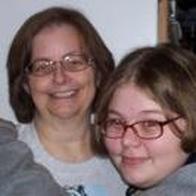Communication has been uppermost in my mind over the last several months - my beloved nephew Jason (who came to live with us in September 2006; he calls me "Aunt Mom") is in the Marines, stationed at Camp Pendleton in California. Since June his battalion has been in one of the most dangerous areas of Afghanistan. My fears for him were much assuaged by the regular updates he posted on Facebook, along with the private messages we sent back and forth. Yesterday, when I was trying to figure out how to let my Aunt Ethel know that Jason was back in the states, safe and sound, I sent a message through Facebook to her grandson Aaron (my cousin), asking him to call and let her know. He replied within 10 minutes.
When Stacy was in Spain for 3 months in 2008, we communicated not just by email and instant messaging, but also through Facebook; where she was able to post pictures of some of the places and events (bullfights!) she was experiencing. Now that she's at the University of Oregon in Eugene, and we get to see her only 3 or 4 times a year, it's been nice to chat using Facebook's messaging system.
Being a librarian by profession, I love reading and information. I used to get my information solely from print sources: books, magazines and newspapers. Since the advent of the digital age, I find that more and more, I'm getting information online. I read newspapers on my laptop, and I've been reading books, more often than not, on my iPod touch Kindle. But one of the most important sources of information for me has been Facebook. Now that I've connected with genealogists all across the country (and internationally, in England, Scotland and Australia), when they post links to interesting articles or books, I follow up, and my education and experience are enhanced. A good example is a link someone posted to a recent article in the Smithsonian Magazine: The Dark Side of Thomas Jefferson. Many of my 306 (and growing) friends post links to blogs they write - such as Judy G. Russell's Lives as Property, part of her Legal Genealogist blog, which in turn points to an important collection of online NC deeds from the 1800's. Thomas MacEntee (the King of Social Media for genealogists, as far as I'm concerned!) posts links to new blogs he discovers and keeps us updated on breaking news. Since I'm a member of several groups and organizations (or have "liked" their Facebook pages), I get regular updates from groups like the Western Michigan Genealogical Society, the historic Oakwood Cemetery in Raleigh, North Carolina, Elizabeth Shown Mills' Evidence Explained; Facebook is where I find out about the new QuickLessons, such as QuickLesson 12: Chasing an Online Record into its Rabbit Hole.
But for me, most of all, Facebook is about relationships. I'm an introvert anyway, and genealogical research tends to be a solitary endeavor. Because of Facebook, I have ongoing relationships with many people, from many different aspects of my life. Who would have thought, when I graduated from Florida State University in Tallahassee and moved to Seattle, that I would be able to keep in touch, on a daily or weekly basis, with the close friends I'd found there? I have friends from as far back as junior high school, who live across the country, most of whom I haven't seen in years. There are friends from my present church and my former church; friends from the church I worked at, and I'm even friends with several of my children's friends. (They keep me young!) I have a growing number of friends I've met (and some I haven't yet) at genealogy institutes and conferences. I consider that I have relationships with all these people - they're teaching me, and (hopefully) I'm teaching them by what I post.
So even with all its problems, I hope Facebook is here to stay. I would be hard pressed to keep abreast of current events in the world of genealogy, and in the lives of my children and friends, without it.

 RSS Feed
RSS Feed